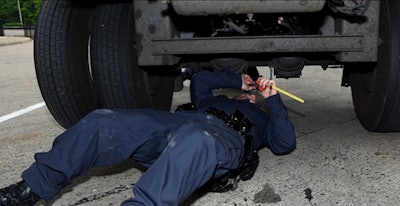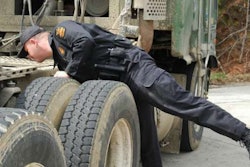
Results from last summer's Brake Safety Week are in and show 4,664 commercial motor vehicles inspected in the U.S. were placed out of service because of brake-related problems. That equates to 13.6% of the 34,402 vehicles inspected in this country during the Commercial Vehicle Safety Alliance's annual inspection blitz held Aug. 21-27.
That compares to 3,874 vehicles (13.5% of the 28,694 inspections) placed out of service during the 2021 brake inspection week. In 2020 35,778 inspections were conducted in the U.S., and 4,565 vehicles (13%) were placed out of service for brake-related violations.
Next year’s Brake Safety Week is scheduled for Aug. 20-26.
CVSA's Brake Safety Week was conducted in the U.S., Canada and Mexico. A total of 38,117 vehicles were inspected. Law enforcement officers in Canada inspected 1,975 commercial motor vehicles during the event, and placed 351 (17.8%) out-of-service for brake-related violations. In Mexico, 1,740 commercial motor vehicles were inspected, and 44 (2.5%) were placed out of service
RELATED NEWS: Mark your 2023 calendars for CVSA's various enforcement efforts
Commercial motor vehicle inspectors in Canada, Mexico and the U.S. conducted 38,117 inspections of commercial motor vehicles Aug. 21-27 for Brake Safety Week. Of the total number of commercial motor vehicles inspected, 13.3% were placed out of service for brake-related critical vehicle inspection item violations. That also means that nearly 87% of the commercial motor vehicles inspected throughout North America during Brake Safety Week did not have brake-related critical vehicle inspection item violations.
The three countries' inspectors documented 6,305 brake hose/tube chafing violations, which are a common brake-related violation and was the focus area for this year’s Brake Safety Week. Inspectors reported brake hose chafing violations in four different categories, with varying levels of chafing severity, including two which were out-of-service violations.
ACCORDING TO THE CVSA, During Brake Safety Week, inspectors primarily conducted the North American Standard Level I or Level V Inspection. Both inspection levels include a thorough examination of brake systems and components. Inspectors look for missing, non-functioning, loose, cracked or broken parts, such as spider castings, return springs, brake drums or rotors, brake shoes, linings or pads and slack adjusters. They also inspect for contaminated linings or pads, non-manufactured holes in spring brake housings, S-cam flip-over, and audible air leaks. They check for mismatched brake chambers on an axle, security of air reservoirs, condition of hoses and lines, air pressure in the system, the breakaway device, tractor protection system, pushrod travel and brake-system warning devices.
Vehicles that did not have any vehicle and driver out-of-service violations during a Level I or Level V Inspection may have received a CVSA decal, which is a visual indicator (valid for three months) to inspectors that the vehicle was recently inspected and had no critical vehicle inspection item violations.










